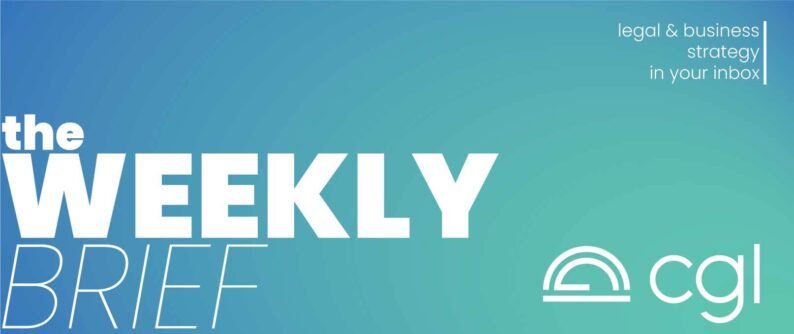Interest in generative AI skyrocketed in late December and early this year. Generative AIs, like ChatGPT, create content that sounds like it could be written by a human.
Interestingly, generative AI has been around for some time. However, ChatGPT is the first tool of its kind that has hit the mainstream media.

Screenshot of Google Trends Data for the search term ‘ChatGPT’
While it is being touted as a disruptive tool and its use cases are widespread, there are legal risks posed by the use of ChatGPT and other generative AI tools, including the following:
Legal Risks of Using Generative AI Tools
IP Infringement
AI-generated content is written entirely based on the existing content that the AI has been ‘fed’. If content that the AI has been ‘fed’ includes work that is subject to copyright, then the AI-generated output may infringe intellectual property (IP) rights if it retains substantial similarities to the original.
Misleading and Deceptive Representations
The FTC is charged with protecting US consumers from misrepresentations by businesses about their products and services. This includes misstatements about quality, origin, safety, and the degree to which personal information about consumers is collected, used, and protected.
Generative AI tools do not know about these rules, nor does it understand your product. Instead, it relies on the information it has been previously fed. As a result, AI-generated content may misrepresent material facts about your business, causing you to run afoul of existing rules in the US that restrict the use of misleading and deceptive statements.
Open AI’s Terms of Use statement notes: “You are responsible for Content, including for ensuring that it does not violate any applicable law….”
Fake News & Defamatory Statements
While laws don’t currently restrict the sharing of fake news (though your business may suffer reputational damage), there are laws against defamation. If your AI-generated content discusses an individual, there is potential for it to make untrue and/or defamatory statements about that person.
Commercial-Use Licensing
While OpenAI currently assigns “all its right, title and interest in and to Output”, this may change in the future. OpenAI is in the process of introducing paid plans for ChatGPT, and commercial use of the writing generated may be restricted under the new model. Keep an eye out for key changes in this regard.
Best Practices When Using AI-Generated Content
Use AI-Tech As Tools, Not Writers
ChatGPT and similar generative AI tools can be (safely) used as a writing aid for your marketing department. If you opt for this route, ensure your internal policies state that generative AI can be used to generate ideas and inspiration, but that your team, contractors, and third-party knowledge workers may not use AI-generated writing verbatim.
Disclose If The Content Is AI-Generated
If you elect to use AI-generated content, you should consider disclosing that it is AI generated and include an appropriate disclaimer.
Don’t Feed the AI Trade Secrets
Many generative AI tools, including ChatGPT, use your inputs as a learning tool. This means that your trade secrets may not remain secret if they are input into a generative-AI tool.
Have Humans Edit The Writing
Human editors are going to be a key protection against fake news, material misstatements, and defamatory language. Train your staff to look out for these types of issues.
Don’t Forget About Third Parties
If you outsource any aspect of your operations where the final product returned to you is writing, you should ensure that your agreements consider generative AI, including when and how it may be used.
If you’re concerned a third party is using AI-generated content contrary to your agreement, there are tools that may detect the use of AI – such as ZeroGPT.
Don’t hesitate to reach out with any questions or concerns about your plans for generative-AI tools.
Disclaimer
The materials available at this website are for informational purposes only and not for the purpose of providing legal advice. You should contact your attorney to obtain advice with respect to any particular issue or problem. Use of and access to this website or any of the e-mail links contained within the site do not create an attorney-client relationship between CGL and the user or browser. The opinions expressed at or through this site are the opinions of the individual author and may not reflect the opinions of the firm or any individual attorney.



